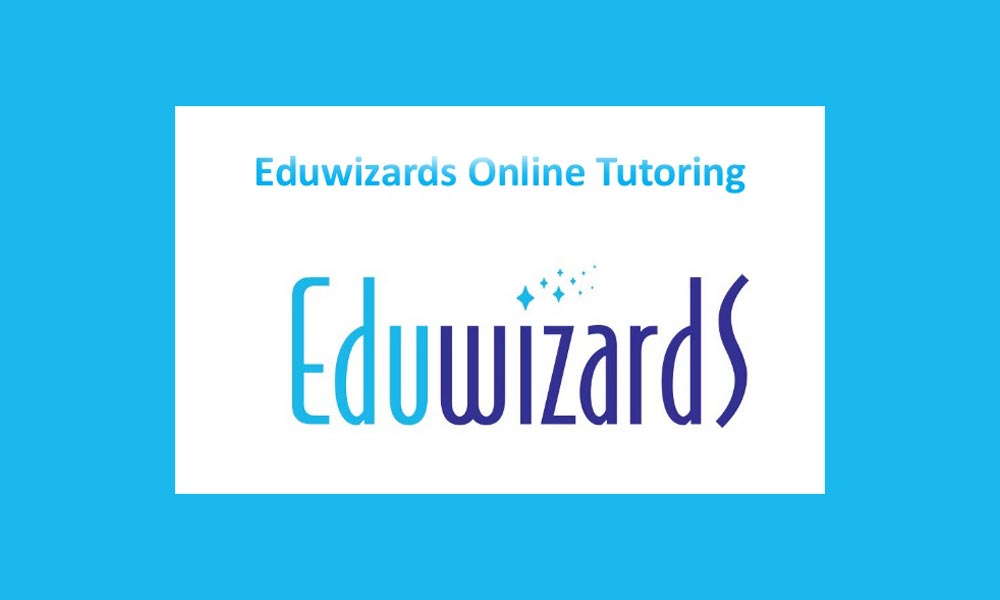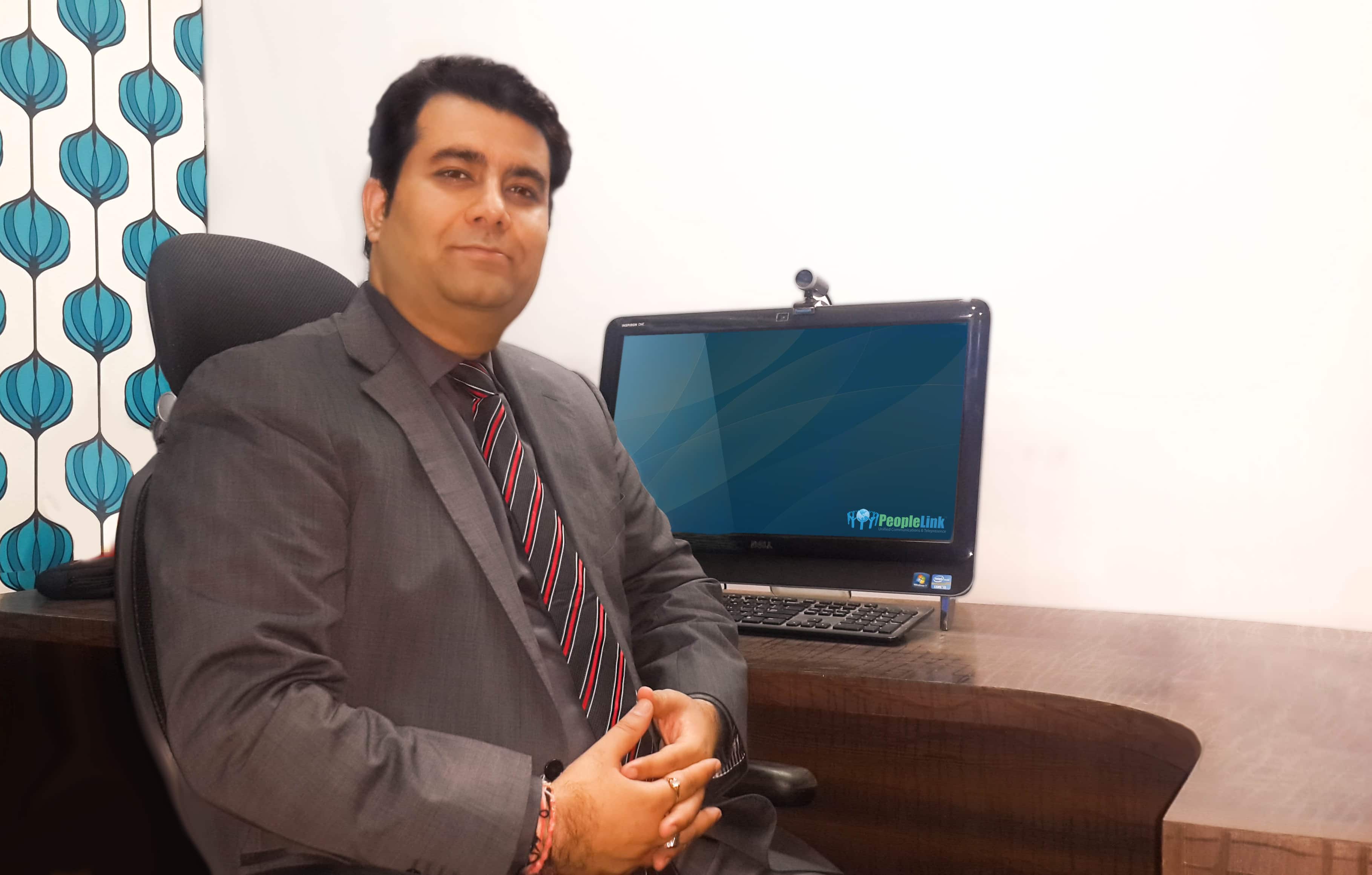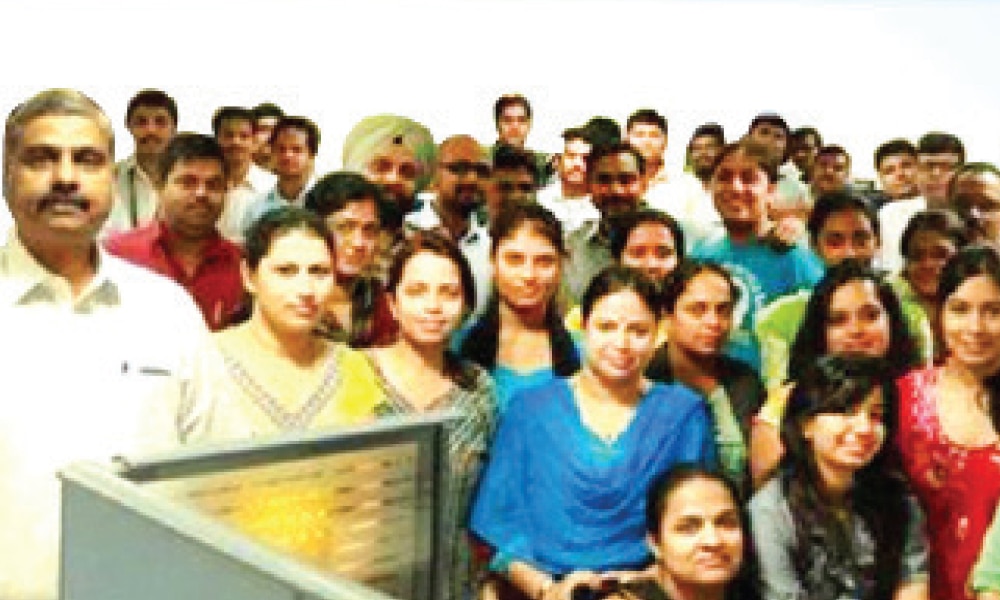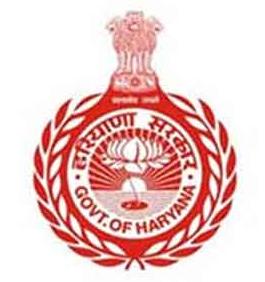
Chandigarh, August 29- The Haryana Government has decided to set up a University in district Gurgaon.
This was stated by Education Minister Mr Ram Bilas Sharma while replying to a question in the ongoing Monsoon Session of Vidhan Sabha here today.
The Minister said that the work to set up the University would commence within the current year. He said that Chief Minister Mr Manohar Lal had announced in a public meeting at village Kakrola in April this year that a University would be set up. The Kakrola Panchayat has also agreed to provide land for the same and had also passed a resolution to transfer land measuring 398 kanal three marla for setting up the University.
The Education Minister also assured the House that all Engineering and B.Ed colleges affiliated to the Kurukshetra University, Kurukshetra would not be shifted to any other University.
University to come up in Gurgaon
Eduwizards wins Digital/Online Start-up award
India’s leading Home and Online Tutoring platform Eduwizards.com has won the “Digital/Online Start-up” award during the Entrepreneur India 2016 convention held in national capital.
The award aims to recognise and felicitate Achievers and Innovators, who have unleashed breakthrough Ideas, Innovations and Insights needed to disrupt the social, economic and tech ecosystem.
In its 6th Annual edition, the two-day Entrepreneur 2016 conference (Aug 23-24) brought together inspiring entrepreneurs and leaders for creating new opportunities for partnerships, investment and collaboration as means to address some of the most intractable society challenges.
Speaking on the occasion, Eduwizards Co-founder Ashish Sirohi said: “Eduwizards tutoring volume has been growing 30% month-over-month since we launched in India in August 2015. 80% percent of the total tutoring sessions have been paid sessions. 90% of the tutoring sessions have been from repeat students. The efficiency is being driven by making students and tutors aware that Eduwizards has a lot more to offer them than others.”
“There is no Tutoring Platform in India comparable to Eduwizards and we stand well above education verticals that are also in the business of providing home and online tutors. World-class technology is the backbone of our platform,” he said. “
“Eduwizards Live Tutors App has whiteboard with crystal clear voice even at low bandwidth of 100 kbps. Leading USA and India companies providing App-based tutoring don’t even have App-based whiteboard, let alone whiteboard with voice. We are also the first Indian Education company to develop IRT Adaptive technology in-house. Our NCERT Solutions and other apps are all favourites among students.”
Among the speakers were Ravi Gururaj, Chairman, NASSCOM Product Council, Prashant Prakash, Partner, Accel India, Amanpreet Bajaj, Country head, Airbnb, Abhiraj Bhal, Co-founder, UrbanClap and many more.
Eduwizards.com technology platform, with 23,000 tutors across 50 the country, allows students to connect with the best tutors for both Home and Online Tuition. Students can choose Face-to-face Home tutoring or Online tutoring.
Eduwizrads’ innovative Edtech platform offers world class technology and other unique advantages for both students and tutors.
Indian students who take (Face-to-face or Online) tuition with Eduwizards tutors get several benefits including Free Online Testing & Practice exams based on International standards adaptive assessment technology called Item Response Theory (IRT). Students who take regular tutoring with Eduwizards also have free access to the Live Tutors App for help 24×7.
Government initiates registration of Indian students studying abroad
Chandigarh, August 23– Haryana Education Minister, Ram Bilas Sharma said that the Union Ministry of External Affairs has initiated the process of Registration of Indian students studying abroad, so as to compile data of such students so that the Government would be able to advise them in hour of need.
The Minister said that the Students Registration Module has been placed within Union Ministry’s ‘MADAD’ portal. He said that the data entered into this module in a voluntary manner by the Indian students abroad would provide useful inputs about the pattern of migration of Indian students globally, educational courses that they are registering in and related issues.
Happy Schools to be set up in Haryana
Chandigarh : As many as 200 eLearning Centres and 100 ‘Happy Schools’ would be established in Haryana with the assistance of Rotary Foundation under its ‘Rotary India Literacy Mission’.
This was disclosed by the education minister of the state Ram Bilas Sharma while he was speaking at the ‘Ujala Intercity Showcasing Literacy and WinS Projects’ programme organised by Rotary Club of Mohali, SAS Nagar, under the aegis of Rotary India Literacy Mission here today.
He said that as the Rotary Foundation was collaborating with the governments of Gujarat and Maharashtra in the field of education, similarly, the concept of eLearning and Happy Schools would also be introduced in government schools in Haryana. He also lauded the work being carried out by the Rotary India Literacy Mission in this field.
He said that two women had brought laurels to the country by winning Silver and Bronze medals at the Rio Olympics-2016, and their exploits would serve as a source of motivation for other sportspersons, especially women.
District Governor, Rotary, Raman Aneja, said that 75 Rotary Clubs in Haryana, Punjab, Chandigarh, Himachal Pradesh, Uttar Pradesh and Uttarakhand were engaged in the literacy mission. He said that training would be provided to 1,000 teachers, at least 15,000 adults would be imparted basic literacy, and in association with Aasha Kiran nearly 5,000 dropouts, would be brought back to schools by June, 2017. Apart from this, 500 eLearning Centres and 100 Happy Schools would also be established, he added.
On this occasion, Rotary Literacy Hero Awards were given away to Vatsal Chhaya of Chandigarh, Chetna Foundation of Panipat, Udaan Foundation of Saharanpur, Principal of DAV Police Public School in village Moginand, district Panchkula, Satish Arora, founder of Prerna, and Usha Bhatia of Ropar, who are working in the field of literacy promotion.
Those present on the occasion included, Additional Chief Secretary, School Education, Additional Chief Secretary, Higher Education, Vijai Vardhan, Chairman, Zonal Literacy Committee, Ranjan Dhingra, and other prominent personalities.
Setting the Course of Education :: July – August 2016
| Editorial | |
| Promoting the Cause of Education | |
| Cover Story | |
| Setting the course of education | |
| School Education | |
| ICT Overhauls school education | |
| Higher Education | |
| ICT Prompts Advancements in higher education | |
| Education Policy | |
| Nonprofit Policy Mandate in Education deters private investments | |
| Company Profile | |
| Reviving Childhood with Bulbul Apps | |
| Case Study | |
| Tech Solutions that enhance efficiency | |
| Special Feature | |
| Data-Wise Student Data Augments School Teaching | |
| Innovative Education | |
| Global Discovery Academy Turning Students into Future Leaders | |
| Interview | |
| New Dimensions in Education | |
| LearnEngg Provides e-Learning Solution | |
| Technical Education | |
| Echelon Institute of Technology Engineering Innovations | |
| Industry Speak | |
| CRM Simplified | |
| eduTech | |
| Technology in Exams Scaling new Frontiers | |
| Video-enabled Learning Management Solution | |
| Event Report | |
| Karnataka in Focus as Higher Education Hub |
Video-enabled Learning Management Solution
There is a tectonic shift in the field of education wherein the conventional methods are being challenged by the technology-led education systems. Educational institutions are using various technological equivalents, like the evolution of VILT (Virtual/ Visual Instructor-led Training) culture, to provide the much-needed differentiation among their peers, writes Amit Chowdry, CEO – PeopleLink
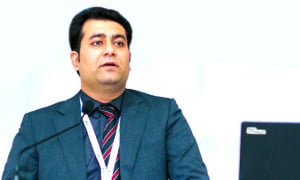
CEO – PeopleLink
PeopleLink’s Video-enabled Learning Management Solution (VeLMS) provides a blended experience of in-class and virtual remote classes with the same impactful and engaging course delivery methods. The Industry has been moving towards the newer trends of providing virtual and technology-led content over the Internet. Offerings like VeLMS being SCORM-compliant ensure a universality in its course / content management along with the capability of integrating a Live Video over web to make learning fun and effective at the same time.
“We, at PeopleLink, have created an intuitive experience for the educational institutes called the Video-enabled LMS to connect the learners with trainers in real-time and provide their engaging content along with the option of Live Video to bring realism in the virtual education methods,” says Amit Chowdry, Founder CEO of PeopleLink Unified Communications Pvt Ltd.
Experts from the Education vertical have often stressed on the challenges faced by the educational institutes in integrating their classroom digitisation with content management, which generally come from different vendors. The need of the hour is to determine the most appropriate solution provider with a complete product portfolio. PeopleLink has a comprehensive product line of Podiums, Visualisers, Lecturer-tracking Cameras, Classroom Audio setups, along with the state-of-the-art VeLMS, which provides easy User Administration, Universal Content Management, effective and transparent Evaluation Techniques, along with seamless schedulers, feedback and competency reporting features.
The country currently is employing methods to have a larger base of skilled manpower for moving towards the eradication of unemployment issues. There are institutions, both private and government initiated, which are starting their individual efforts towards skill development. The key to highest penetration and farthest reach-out can be achieved only by the use of Video. The Government is trending towards having customisable solutions,
There is a new trend being adopted by universities wherein, they Live Video-stream their important functions, like annual day, convocations or launch ceremonies, to reach out to the larger student community, alumni and parents of the students. We ourselves have been associated with several such institutions like, Integral University (Lucknow), Anand Agriculture University (Gujarat), etc., for their streaming requirements.
Abhishek Pratap Singh, Head-Marketing, PeopleLink
which have the flexibility of effective and dynamic content authoring in different languages to have a larger access base.
PeopleLink recently implemented one of the largest Video deployments for IIT-Gandhinagar having around 800-port connectivity. The institutions of higher education have been making use of these visual capabilities for conducting much engaging learning sessions virtually.
In another of our synchronisations with the institutions, including Veer Bahadur Singh Purvanchal University, Jaunpur, which recently joined the race of firsts in creating virtual classrooms by deploying Video-enabled digital podiums, along with Document Visualisers with capability of conducting Live Lectures with distant and affiliated colleges using PeopleLink Video Collaboration.
Not just the educational institutions, but various organisations with training requirements, are adopting the Video-enabled learning solutions for training their students, staff and partners. This not only brings down the cost involved in training but also increases the reach and effectiveness. Institutions have started using these technologies to initiate Distance Education programmes, Rural Education drives, International Courses, etc. Students can use these technologies and content to interact with the best of institutions without the need of travelling and having an access to vast Digital Libraries for accessing content to encourage self-paced learning.
Technology in Exams Scaling new Frontiers
One of the first instances of high-stake Computer Based Tests (CBT) in the country was seen in 2003 and since then, various exams boards have adopted CBT mainly for their entrance examinations, writes Ravi Panchanadan, Chief Executive Officer, MeritTrac Services

Chief Executive Officer, MeritTrac Services
During the last couple of decades, the world has undergone a massive transformation with increasing impact of technology in almost every aspect of life. The practices we adopted in our lives previously have become obsolete. We are witnessing new methods becoming the norm.
In these Changing times, education has witnessed a massive transformation in most parts of the world and India is no exception. Universities delivering classes online, thereby negating the limitation of time and space in education delivery, has been a paradigm shift leading to introduction of new scalable models. The evolution of Massive Open Online Courses (MOOCs) is democratising high quality education and making knowledge available for masses.
Examinations, a critical aspect determining success of education, have also undergone transformation. One of the first instances of high-stake Computer Based Tests (CBT) in the country was witnessed in 2003 and since then, various exams boards have adopted CBT mainly for their entrance examinations.
IIM CAT entrance exam is the one of the first national level high-stake exam that went online in the country. Its initial hiccups had almost stalled the progress made in adoption of Computer Based Tests in India, but the successful comeback it made in 2010 gave confidence for more and more examination boards in the country to adopt Computer Based Tests.
In 2010, MeritTrac, along with EDGE and Value Notes organised a study designed to learn views on introduction of technology in examinations. With less than 10 examination bodies having embarked on transformation using technology, it was important to understand the industry’s views on leveraging technology in future. The study was administered on the key stakeholders in the education system – exam authorities and students.
The study revealed that around 68% of Indian examination bodies had concrete plans to leverage technology in examinations, with specific reference to Computer Based Examinations. The key priorities for these universities were the need to increase the speed of result processing, transparency and security of high-stake examinations whileover 75% student’s perceived transparency as a major benefit. Over 68% of them also believed that computer based tests will offer accurate and timely results. While the major stakeholders were looking forward to the migration, 62% of the respondents had concerns over the availability and quality of infrastructure.
Changes over last 5 years Since this research, Indian education system has witnessed a massive migration from paper-based test to CBT. Transformations embarked by some of the large exam bodies have offered confidence for others to follow. Today over 100 examination bodies have migrated their entrance examinations to CBT. While the 2010 MeritTrac research predicted a massive shift, we are all ‘stumped’ by the pace of this transformation. With the recent UGC directive mandating universities to adopt technology for admissions, this number is expected to be increase further.
A few factors have led to this fast paced migration:
- Changing mind-set – Openness to leverage technology for several high-stake initiatives have given education administrators the confidence todeliver various facets of education also using technology. Examinations was only a logical extension to this.
- Improved infrastructure – Today, India is one of the fastest growing internet markets. The expanse of computer infrastructure to the last mile – villages and other rural areas has fostered the possibility of making computer based exams inclusive. Gone are the days when technology was limited to the geographical boundaries that divided cities from villages. Government’s emphasis on reaching broadband into villages will further enhance the possibilities of computer based exams.
- Rise of ‘Digital Natives’ – It is understood that digital natives are natural adopters of technology. The increasing use of mobiles and access to internet have extended the possibilities of computer based exams in the country. Candidates have greater understanding of technology and hence are not flustered in computer labs. l
- Growing need for transparency & security – With increasing population and stakes, there is a greater demand for improving transparency and security of examinations. It is well accepted that technology could play a critical role in assisting examination bodies in achieving its goal of secure, transparent and high quality examinations.
- Technology advancement and reduction in IT costs– Technology is today designed for greater scale and operational efficiencies. With it CBT has become viable for most examination boards. Moreover, its benefits easily outweigh the cost and technology implications.
Yet, the use of technology in examinations have till been limited to entrance examinations. Most of the vast majority of other examinations – summative / term-end examinations are still following traditional models exposing itself to inefficiencies and security threats.
Technology for Summative Exams
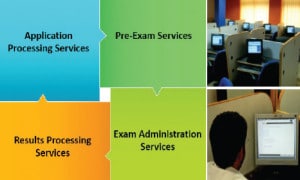 The next big technology revolution in examinations is On- Screen Marking (OSM), also referred to as ‘Digital Evaluation’. A few large examination boards in the country have already adopted this technology and reaped rich benefits. OSM has allowed examination bodies to enhance quality of evaluation of descriptive answer scripts while making it transparent and secure. They have also succeeded in publishing results faster. Ability of this technology to allow evaluators to evaluate from home also leads to greater convenience for the examination body and its evaluators. This is a technology that has been widely used in most developed countries. The initial success of OSM in India will definitely have a ripple effect in the country.
The next big technology revolution in examinations is On- Screen Marking (OSM), also referred to as ‘Digital Evaluation’. A few large examination boards in the country have already adopted this technology and reaped rich benefits. OSM has allowed examination bodies to enhance quality of evaluation of descriptive answer scripts while making it transparent and secure. They have also succeeded in publishing results faster. Ability of this technology to allow evaluators to evaluate from home also leads to greater convenience for the examination body and its evaluators. This is a technology that has been widely used in most developed countries. The initial success of OSM in India will definitely have a ripple effect in the country.
Large and prestigious examination bodies have been looking for solutions that can help make their exams secure, transparent and efficient. One of the biggest challenges with these high-stake exams is that they are vulnerable to risks and frauds. Ensuring security of question paper has been a priority for these examination bodies. Question paper printing, transit and storage have traditionally been vulnerable to leak and exposure. These instances could lead to reputational risks and legal challenges.
So, how can technology help these examinations become more secure?
Today over 100 examination bodies have migrated their entrance examinations to Computer Based Tests (CBT). With the recent UGC directive mandating universities to adopt technology for admissions, this number is expected to be increase further
Just-in-Time Question Paper (JIT-QP) management – a process of managing question paper security with application of technology, will ensure that question papers are not exposed till the time of examination. The question bank managed by the examination body generates question papers which are accessible at the test centre by ONLY the designated official minutes before the examination. The solution prints the exact number of question papers as required in the centre under surveillance, thereby ensuring its security. This technology coupled with the OSM service has already helped a state university in administering secure exams and speed up turn-around of results.
After the successful adoption of CBT, OSM and JIT-QP management are the next big transformations that we will witness in the India. With increased fairness, security, transparency and faster turn-around time, students will be the greatest beneficiaries of this introduction of technology.
Echelon Institute of Technology Engineering Innovations
The Echelon Institute of Technology, Faridabad, has carved out a niche for itself among the renowned technical institutions, thanks to its focused dedication towards creating a culture of inspiration, exploration and growth. An evaluation.
Situated in Delhi’s National Capital Region (NCR), the Echelon Institute of Technology, Faridabad, is a brand name among the comity of technical institutes.
Nestled in the sylvan surroundings on Kheri-Manjhawali Road, 20 km from South Delhi, the Institute is spread over a sprawling lush green campus of 17.5 acre. It was established with the vision of “technical leaders engaged in the evolution of life being at the frontiers of continuous technological breakthroughs inspired by ongoing exploration of self, society and nature” in 2007-08.
It has scaled great heights both in terms of academics and integrated holistic growth of students with a commitment of being a cause in their evolution as leaders in the society making meaningful contributive creative free choices.
The institute has carved out a niche for itself among the renowned technical institutions on account of its focused dedication towards creating a culture of inspiration, exploration and growth as the genesis of spurring hunger to continually delve into the scientific puzzles as the cornerstone of excellence in education.
It is equipped with the state-of-the-art infrastructure, highly qualified and experienced faculty, full scale training and placement departments, including in its ambit an Entrepreneurship Cell and a specialised Industry-Institute Partnership Cell and deep mentoring relationship with each and every student.
The Institute, with its fundamental tenet of evolutionary partnerships and collaborative creation at its core, with all the stakeholders including faculty, staff, students and the general community around, works through 15 clubs covering all facets of being human to continually explore the world within and without.
The Institute, with its fundamental tenet of evolutionary partnerships and collaborative creation at its core, works through 15 clubs covering all facets of being human to continually explore the world within and without
It strongly believes that technical breakthroughs in the world outside are only possible with simultaneous evolution as human beings within, altering the very culture we live in.
The Echelon Institute was the first institute in Haryana to have been accorded Outcome-based Accreditation by the National Board of Accreditation (NBA) as per Washington Accord & ABET norms.
The institute is managed by the community of “The Last Centre”. The Last Centre is a community of spiritual seekers dedicated to “unparalleled service to humanity” through social entrepreneurship.
At Echelon, the main focus is on Active and Experiential Learning. The Institute is pioneering the Experiential Engineering Education in the country. It believes that creation is possible only in an impersonalised coming together of all the individuals, with undivided focus on dissolving the challenges and generating the wellbeing of the whole community.
LearnEngg Provides e-Learning Solution
The scenario of higher education in India fails to match global quality standards says Dr. S. M. Nabi, Director, Infoplus Technologies Ltd in a conversation with Elets News Network (ENN)
What is the current situation of Higher Education system in India and how do you think your contribution envisages to over-come that?
India’s higher education system is the world’s third largest in terms of students, next to China and the United States. Unlike China, however, India has the advantage of English being the primary language of higher education and research. The overall scenario of higher education in India does not match with the global quality standards mainly due to highly diversified nature in terms of cultures, languages, economic status and geographical locations, widening the gap between urban and rural areas.
Leveraging the technological developments, we provide the students to learn the subjects anywhere any time, offering a personalised learning environment
How your solution is going to address the current challenges?
LearnEngg is a trade-name christened for our visual-rich accelerated e-Learning solution. Our immediate focus is on imparting highly effective technical education, namely, 4 year Graduate Engineering, 3 year Engineering Diploma, 2 year ITI Trades and skill development programs. LearnEngg conforms to the prescribed syllabus of the University/ Educational Agency, aptly crafted with relevant real-life demonstrations of appropriate 3D visuals, thus imparting highly effective and quality education. It provides nearly 250 visuals in 2D/3D formats to explain a typical 45 Lecture hours subject.
Have you implemented your solutions in Universities or Technical Boards?
We have implemented LearnEngg solution in 5 States, namely all Govt. ITIs in Kerala, Govt. Polytechnics in the states of Telangana, Andhra Pradesh and West Bengal for Diploma Engg, Visvesvaraya Technological University and its affiliated Engineering colleges in Karnataka; Our solution has earned the Chief Minister’s e-Governance Award of 2014 in Kerala, especially for the upliftment of Girl Students from Rural Environment.
How can your contribution help in “Skilling India” and other policy frame works of Higher Education in India?
LearnEngg, with visual-rich ICT based technology driven e-learning solution, facilitates developing world class skilled workforce. It virtually brings the industry to the student and thereby strengthen Industry Partnership, making the Students Industry-Ready and hence enhancing employability. Skill development needs to start within the formal courses not as a separate compartment. Hence, we have adapted mix of academic and industry requirements within our product. Leveraging the technological developments, we provide the students to learn the subjects anywhere any time, offering a personalised learning environment. Coupled with the emphasis of promoting Digital India by the Govt of India, our solution is the least-cost model towards capacity building of vital skilled resources, aiming at making India a knowledge super power in the global economy.










